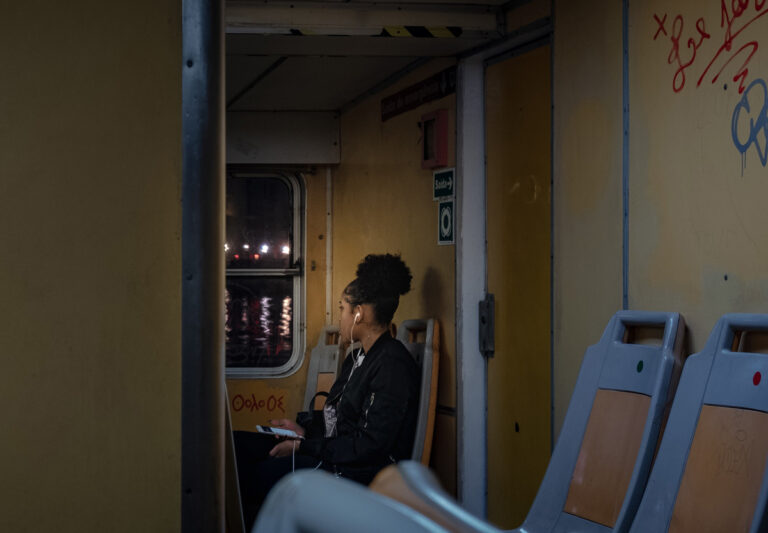New dating app Vinylly lets your music preferences dictate your love life

Remember matching with someone based on nine watermarked photos that have travelled every single editing app along with a bio that reveals close to nothing about that person? What about all of the ‘conversation starters’ you have Googled just to keep your DMs alive? Introducing Vinylly, a dating app that matches users based on their music streaming data and habits—allowing users to literally tune into their love life.
What is Vinylly and how does it work?
Available on both Google Play and App Store, Vinylly is a Phoenix-based dating app founded by Rachel Van Nortwick. Born out of her love for both music and marketing, Vinylly essentially bridges the gap in “superficial dating app conversations which lead nowhere.”
“Discussing music is a way to say ‘tell me who you are without telling me who you are.’ And with Vinylly, we use your music streaming data to take it one step further,” the CEO explained in an interview with NYLON. Highlighting music’s power of bringing people together as a huge inspiration behind the app, Van Nortwick mentioned the app’s flexibility in not just finding soulmates, but also discovering potential concert buddies.
So if you are an audiophile or someone looking for a platonic or romantic +1 to attend the next rock concert in Spain with, take notes because here’s how Vinylly works.
Hey everyone-today's the day! Vinylly is available for #Android OS on the #GooglePlayStore🎉! To celebrate, it's completely FREE to chat 💬 and match with whomever you vibe with💏. #spotify #spotifyplaylist #musicmatch #musicconnects #musicconnectspeople #findasong #datingapp pic.twitter.com/Ow3DZ1XPZf
— Vinylly (@Vinyllyapp) February 24, 2021
After downloading the app, users can get started by connecting their Spotify accounts to it. This is a fairly simple process if you are already logged into Spotify on the mobile app. After granting Vinylly access to their music streaming data, users are redirected to a series of questions ranging from their gender and preferences to their current relationship status. Users then have the option to set the radius up to 900 miles around their location to find potential matches.
Breezing through the signup process, users then go through a list of questions to further analyse their taste in music. Ranging from favourite music genres and artists to the latest concerts they attended, the list of questions helps improve the accuracy of the algorithm in finding matches.
Vinylly then onboards users onto the major arena where all of the action happens. Now, if you visualise Tinder’s swiping feature, it can essentially be equated to a stack of pages that you are able to leaf through both left and right. Well, Vinylly’s features have a similar purpose but it feels more like you are using Spotify’s interface to date people.
Potential matches line up as a playlist on Vinylly where the users can either press ‘Play’ to chat and connect with, ‘Pause’ to stop the conversation, ‘Skip’ to move onto the next person, ‘Shuffle’ to move the current user to the back of the lineup and ‘Volume’ to see how good of a match you are together purely based on both of your taste in music. The app further lets you search Virtual Live Stream concerts and suggest them to your matches in chat.
You can also learn a little more about your own taste in music upon visiting your profile. The app draws up a list of genres you love based on your streaming data. Spotify Wrapped, who?
The role of music in attraction
Now that almost all of Vinylly’s features have the potential of redefining dating, let’s analyse if music can truly help initiate—let alone enhance—feelings of attraction in the first place.
“If you find someone who likes the same style of music as you, then you’ll likely get along with them,” said Music Psychologist Doctor David M. Greenberg in an interview with OkCupid. “Our musical preferences are a window into how we think, behave, and care most about. So when someone tells us the music they like, we should listen carefully, because within that answer will be information about that individual’s personality, and whether or not we will be compatible with them.”
A study conducted by Manuela Marin, a former associate of the Institute for Basic Psychological Research and Research Methods at the University of Vienna, presented heterosexual participants with musical excerpts followed by a photograph of a face from the opposite sex with a neutral facial expression. In another set of controlled conditions, only the faces without music were presented.
“Female participants rated male faces as more attractive and were more willing to date the men pictured when exposed to music,” the study concluded. Music is additionally said to affect human courtship behaviour through induced sexual arousal.
All of these researches and quotes point to one fact: music’s impact on attraction is indeed all about that bass. And if you want to experience its effects first-hand then tune into Vinylly right away. After all, the worst that could happen is your ex discovering your dedicated breakup playlist.




